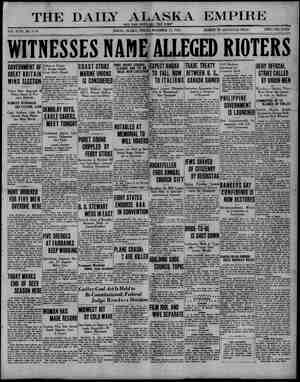Evening Star Newspaper, November 15, 1935, Page 24
You have reached the hourly page view limit. Unlock higher limit to our entire archive!
Subscribers enjoy higher page view limit, downloads, and exclusive features.
\ 'A—-24 THE EVENING STAR, WASHINGTON, D. C., FRIDAY, NOVEMBER 15, 1935 GRANGE IS URGED TOINDORSEA.A.A. But Nebraska Delegates Register Opposition in Call for Production. By the Associated Press. SACRAMENTO, Calif, November 15.—Indorsement of the agricultural adjustment act, with some recommended, was proposed to the National Grange today by delegates from eight States. Opposition was registered by Ne- braska, which presented a resolution calling for the full production of useful products on the theory that prosperity flows from such a course. The States supporting the A. A. A. were not named by spokesmen and the exact nature of the proposed changes was not announced, inas- much as the Grange, as a body, has taken no action upon them. Resolutions introduced by State Master C. H. Bramble of Michigan called for a tariff on starch, an excise tax of 5 cents a pound on butter substitutes and the liquidation of all “needless” holding companies within five years. State Master Fred K. Willson, Min- nesota, proposed a Federal depart- ment of consumer research. Ralph W. Moore, State master of Texas, proposed indorsing the A. A. A. and the processing tax until industry s willing to forego tariff protection. Military Training Opposed. Opposition to military training in school was proposed as a national policy by the Washington Grange through State Master Erwin E. King. America’s farmers are acquiring new ideas of what State governments can do for them from C. C. Cogswell, Kansas Grange master and tax com= missioner. The story of how Kansas balanced its budget and reduced the property tax more than 25 per cent between 1930 and 1934 is well known, but Cogs- well is telling the delegates here of ‘what it has done for the Kansas stock man and wheat farmer. “It has given the Kansas farmer confidence in himself as a factor in the management of public offices,” Cogswell said. “People who never used to go to school district meetings flock there now because under the new budget law the spending program of & political subdivision must be drawn up in public. Can Know How Money Is Spent. “They want to know what the money is going to be spent for and whether it is necessary. “It cleaned up a lot of delinquent taxes and that was a very great help to the farmer. A lot of farm loans are now being refinanced through the Federal Farm Loan Bank that could not be handled before be- cause taxes were delinquent. “The farmers found out in many instances that we had school dis- tricts which had surpluses to carry them along for three years if they never levied a cent of tax. Just take that result on my farm (of 400 acres). After the budget law went into effect I didn’t pay a dime of taxes for a year. We coasted on the surplus. “I guess road machinery sales must have dropped off 80 per cent in Kansas. The companies used to sell districts a whole new machine when a machine needed fixing, but that's all past. And the farmer, as well as other people, are keeping their eyes on their local budgets to see that it doesn't happen again.” Milady’s Sealskin Coat Comes From Bachelor’s Back They Are Only Seals Per- mitted to Be Taken Under Treaty. By the Associated Press. SEATTLE, Wash., November 15.— Milady’s new sealskin coat—even if purchased by her husband—comes from a bachelor’s back. Therein lies the story of the amaz- ing increase of the Pacific seal herds. United States Pisheries Bureau fig- ures indicate the herds have grown from a scant quarter of a million head «to more than three million under 24 years of treaty protecton. Under the treaty between the Unfted States, Great Britain and Japan, only 3-year-old bachelors are slaughtered by the seal hunters. The legal prey is distinguished from other seals be- cause they are adults and are not with 3 mates or young. 5 = The Fisheries Bureau announced ‘ ‘ this year’s supervised take—57,200 Ppelts brought south by the Navy cargo ship Sirius—was auctioned at an aver- age of about $22 each, giving the ex- tant herds an aggregate potential ‘value of about $66,000,000. In 1927, when the seal herds were estimated at 800,000, skins averaged $35, an aggre- gate of about $30,000,000. The three ! nations share the auction proceeds. 5 1 A Conservation of the seal herds by ’ ¢ 4 G e treaty also has resulted in heavy in- o : tru MU R E = e | ' 4 N /PR POUND: > merly. A <_ PERCUP! —are vigilant and progres- sive—and month by month they show improvement from the standpoint of puri- g, originality, skilled pro- uction and lower consumer prices. Today’s Suggestion— EVANGELINE ';;; Assorted CHOCOLATES (Made without Glucose) Sat. and Sun., Nov. 16,17 FOUNTAIN SPECIALS e Cream Cheese T Z and Swiss Cheese—Pickle— 8 . reguler Piat Loft les Cresm 1 Tia Chocalste Fadgo Sspce Regalor35¢ 8t. N.W. oW St 3102 14th St 225 §p STORES—one near you *

